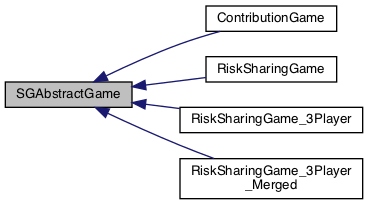A virtual class for constructing games. More...
#include <sgabstractgame.hpp>

Public Member Functions | |
| SGAbstractGame (int _numPlayers, double _delta, int _numStates, vector< vector< int > > _numActions) | |
| Constructor for the pure virtual class. | |
| SGAbstractGame (double _delta, int _numStates, vector< vector< int > > _numActions) | |
| Constructor for the pure virtual class. More... | |
| virtual SGPoint | payoffs (int state, const vector< int > &actions) const =0 |
| The payoff function. More... | |
| virtual double | probability (int state, const vector< int > &actions, int statep) const =0 |
| Transition probabilities. More... | |
| virtual bool | isEquilibriumAction (int state, const vector< int > &actions) const |
| virtual bool | constrained (int player) const |
| Returns true if the given player is incentive constrained. More... | |
| SGPoint | payoffs (int state, int action) const |
| An overloaded version of payoffs that uses a linear action index. More... | |
| double | probability (int state, int action, int statep) const |
| bool | isEquilibriumAction (int state, int action) const |
| int | getNumPlayers () const |
| Returns the number of players. | |
| double | getDelta () const |
| Returns the discount factor. | |
| double | getNumStates () const |
| Returns the number of states. | |
| const vector< vector< int > > | getNumActions () const |
| Returns the number of actions array. | |
Protected Member Functions | |
| vector< int > | indexToActions (int index, int state) const |
| Converts a linear index to multiindex. More... | |
Protected Attributes | |
| int | numPlayers |
| The number of players, always 2. | |
| double | delta |
| The discount factor. | |
| int | numStates |
| The number of states. | |
| vector< vector< int > > | numActions |
| The numbers of actions in each state. More... | |
Detailed Description
A virtual class for constructing games.
The SGGame class has a constructor that constructs an SGGame object from any class that inherits SGAbstractGame. So you can inherit from this class as a convenience for building SGGame objects. For an example of how this is done, see risksharing.hpp. The user provides definitions of a payoffs method and a probability method that return the flow payoffs of the players and the transition probabilities between states, respectively. The value in this is that the user can provide rules for how these quantities are generated, rather than having to generate arrays of these values for passing to the SGGame constructor. See also SGGame::SGGame.
Constructor & Destructor Documentation
◆ SGAbstractGame()
|
inline |
Constructor for the pure virtual class.
Grandfather in old code that is specialized to two players.
Member Function Documentation
◆ constrained()
|
inlinevirtual |
Returns true if the given player is incentive constrained.
The default definition of this method always returns true, so that both players' behavior is subject to incentive constraints. By making this method return false for one or both players, the user can implement models in which players can commit to their actions. When both players are not constrained, the algorithm will compute the feasible payoff correspondence.
◆ indexToActions()
|
inlineprotected |
Converts a linear index to multiindex.
This function takes the linear index of an action pair in state s and returns a multiindex that gives each player's action.
◆ isEquilibriumAction() [1/2]
|
inlinevirtual |
Returns true if the given action pair can be played in equilibrium
The default definition of this method always returns true, so that all action pairs can be played in equilibrium. By redefining this method, the user can create models in which only a subset of action pairs are played on the equilibrium path.
Reimplemented in RiskSharingGame, RiskSharingGame_3Player, and RiskSharingGame_3Player_Merged.
◆ isEquilibriumAction() [2/2]
|
inline |
An overloaded version of isEquilibriumAction that uses a linear action index
This method converts the linear action index into an action pair and then returns the result of the user defined isEquilibriumAction method.
◆ payoffs() [1/2]
|
pure virtual |
The payoff function.
A class that is derived from SGAbstractGame must define the payoffs method, which returns, for a given state and action pair, the flow payoffs that the players receive as an SGPoint.
Implemented in RiskSharingGame, RiskSharingGame_3Player, RiskSharingGame_3Player_Merged, and ContributionGame.
◆ payoffs() [2/2]
|
inline |
An overloaded version of payoffs that uses a linear action index.
This method converts the linear action index into an action pair and then returns the result of the user defined payoffs method.
◆ probability() [1/2]
|
pure virtual |
Transition probabilities.
A class that derives from SGAbstractGame must define the probability method, which gives, for each state and action pair and new state, the probability of reaching the new state tomorrow when starting from the given state and when the given action pair is played.
Implemented in ContributionGame, RiskSharingGame, RiskSharingGame_3Player, and RiskSharingGame_3Player_Merged.
◆ probability() [2/2]
|
inline |
An overloaded version of probability that uses a linear action index
This method converts the linear action index into an action pair and then returns the result of the user defined probability method.
Member Data Documentation
◆ numActions
|
protected |
The numbers of actions in each state.
numActions[s][s] is the number of actions that player i can take in state s.
The documentation for this class was generated from the following file:
- src/hpp/sgabstractgame.hpp
